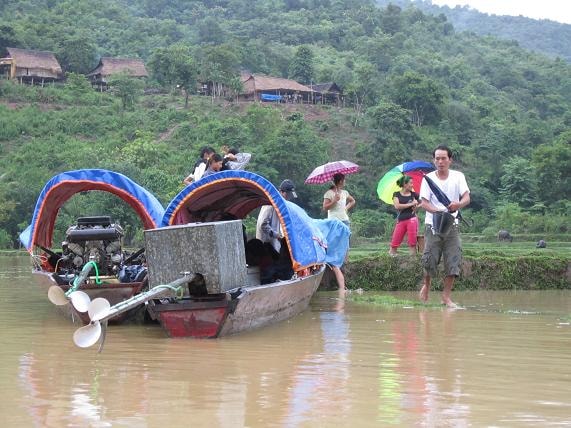Nhon Mai (Tuong Duong): When will the "4 no's" be removed?
After nearly 4 years, Nhon Mai, the first impression is that this land has almost not changed much, except that the water level of Ban Ve Hydropower Reservoir has risen to the center of the commune so it is not necessary to walk for nearly an hour like before and a few sections of road are under construction.
(Baonghean.vn).After nearly 4 years, Nhon Mai, the first impression is that this land has almost not changed much, except that the water level of Ban Ve Hydropower Reservoir has risen to the center of the commune so it is not necessary to walk for nearly an hour like before and a few sections of road are under construction.
Nhon Mai (Tuong Duong) has 12 villages (2 Thai ethnic villages, 3 Mong ethnic villages and 7 Kho Mu ethnic villages) with more than 2,500 people. Nhon Mai is one of the communes currently leading in terms of poverty rate of over 90%. The origin of poverty in Nhon Mai comes from the reality of "4 no's": no electricity grid, no roads, no markets and no phone signal.
For a long time, people here have basically used oil lamps and a small amount of electricity from small turbines placed along the streams. In addition to not ensuring safety, the power source is unstable, often broken and washed away during the rainy season. Lack of electricity is a big obstacle in improving people's knowledge and accessing scientific and technical knowledge for livestock production through audio and visual means. For example, due to not knowing how to prevent diseases, the commune's cattle and buffaloes often have to face epidemics, especially the epidemic in 2010 when hundreds of cattle died in the whole commune.

To get to Nhon Mai, there is no other way than by motorboat.
To communicate with the outside, Nhon Mai people have almost only one way, which is by boat across Ban Ve lake. The fare from here to Thuong Luu wharf (near the hydroelectric plant) is around 100,000 VND/person/trip. This amount is quite large compared to the income of the people, so only when it is really necessary do people go to the district center, and some people do not leave the commune every year. From the commune center to the villages, there is no other way but to walk. There are remote villages such as Huoi Co, Tham Tham, Pieng Luong,... that take 6-8 hours to walk. The remote terrain and difficult traffic, in addition to limiting the work of the people, are also a big obstacle to the study of the students.
Many children have to set up temporary tents near the school to stay and study, with many hardships and difficulties. Some have to climb mountains and wade through streams for hours to get to class on time. These hardships and difficulties are the reasons for low learning results and quality as well as the phenomenon of students dropping out of school. Currently, the number of students in the whole commune who graduate from junior high school and continue to high school can be counted on the fingers of one hand, and the number of students studying at universities, colleges and vocational schools is even smaller. The lives of ethnic people in Nhon Mai are still self-sufficient.
Without a market, the products that people make have no place to sell, and if they bring them to town to sell, they will not have enough money to buy, and there is no one to buy and consume those products. Therefore, people do not have the habit of producing goods. Recently, in the commune, some models of forest planting and livestock development have appeared, but most people have not dared to learn and replicate the models because they are worried about not having a place to sell their products.
The waves of the "network operators" have not yet reached Nhon Mai. Besides letters via post and text messages via boat people, the fastest way to communicate is through a solar-powered satellite phone located at the commune People's Committee headquarters. In sunny weather conditions, this phone can connect to other subscribers, but on cloudy, rainy days, the phone will not have enough energy to operate. Mr. Vi Van Ky, Chairman of the commune People's Committee, said: "In addition to the difficult roads, the problem of communication is also a huge obstacle in the work of managing, leading and directing the grassroots as well as receiving policies from superiors."
Leaving Nhon Mai, we were wondering when the commune will be able to eliminate the "4 no's" so that people can gradually escape poverty?
Cong Kien






